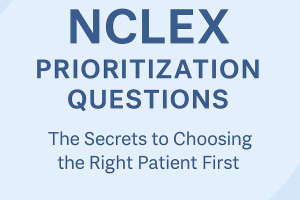NCLEX Study Groups: Are They Worth It or a Waste of Time?

Studying for the NCLEX can feel overwhelming, and many nursing students look for support in study groups. But do NCLEX study groups actually help, or are they just a distraction?
The answer depends on how the group is structured, the study methods used, and whether it fits your learning style. In this post, we will explore the pros and cons of NCLEX study groups, how to make them effective, and whether they are the right choice for you.
The Pros of NCLEX Study Groups
A well-organized study group can provide several benefits:
1. Increased Accountability
Studying alone can make it easy to procrastinate. A group setting encourages consistency because you have scheduled study sessions and group members holding you accountable.
2. Exposure to Different Perspectives
Each person brings unique strengths and weaknesses to the group. You may struggle with pharmacology while someone else excels at it, and vice versa. Explaining concepts to each other reinforces learning and fills in knowledge gaps.
3. Active Learning Through Discussion
Simply reading textbooks or watching lectures is passive learning. Study groups encourage active learning, where you discuss, explain, and apply information, which helps with retention.
4. Improved Critical Thinking and Test-Taking Strategies
NCLEX questions require critical thinking, prioritization, and application. Group discussions help you practice how to analyze questions and eliminate wrong answers more effectively.
5. Emotional Support and Motivation
NCLEX prep is stressful. Being in a study group helps you stay motivated and reduces feelings of isolation. Encouragement from peers can boost confidence and keep you focused.
The Cons of NCLEX Study Groups
Despite the benefits, study groups can also be unproductive if not managed well. Here are some downsides:
1. Time Wasting and Off-Topic Conversations
Unstructured study groups often turn into social gatherings. If the group lacks clear goals or discipline, precious study time can be wasted.
2. Mismatched Learning Styles
Not everyone studies the same way. If the group moves too fast or too slow for you, it may not be the best use of your time. Some students learn best in a quiet, individual setting.
3. Over-Reliance on Others
Some students may contribute more than others. If you find yourself depending too much on the group for explanations instead of doing your own research, it may hurt your independent thinking skills.
4. Misinformation Risk
If group members share incorrect information, it can reinforce misunderstandings rather than helping you learn. Always verify facts using reliable NCLEX resources.
How to Make an NCLEX Study Group Effective
If you decide to join or form a study group, here are some ways to ensure it is productive:
1. Keep the Group Small and Focused
A group of three to five members is ideal. Too many people can lead to distractions and make it hard to stay on track.
2. Set a Clear Study Plan
Before each session, decide:
- Which topics will be covered
- How long the session will last
- How questions and discussions will be handled
Use a structured approach like the NCLEX content blueprint to cover topics systematically.
3. Use Active Learning Techniques
Effective study groups go beyond just reading notes. Use methods like:
- Practice questions and rationales
- Teach-back method (each person explains a concept)
- NCLEX case scenarios to apply critical thinking
- Timed quizzes to simulate test conditions
4. Minimize Distractions
Set ground rules to avoid distractions, such as:
- No personal conversations during study time
- No phone use unless looking up information
- No last-minute topic changes
5. Set Measurable Goals
At the end of each session, each member should be able to explain key concepts. A good goal is: “By the end of today’s session, we should all be able to answer 80 percent of practice questions on this topic correctly.”
Who Should Join a Study Group?
NCLEX study groups are a good choice if you:
- Learn best through discussion and verbal explanation
- Need accountability and structured study sessions
- Want help with critical thinking and application-based learning
NCLEX study groups may not be the best fit if you:
- Prefer quiet, individual study
- Have trouble staying focused in group settings
- Find that group discussions slow down your learning process
Final Verdict: Are NCLEX Study Groups Worth It?
Study groups can be effective, but only if they are structured and focused. If you find yourself more distracted than productive, it may be better to study alone or use one-on-one tutoring.
Best approach? Try both. Mix independent study with occasional group sessions to get the benefits of both methods.
What has your experience been with NCLEX study groups? Let us know in the comments.






